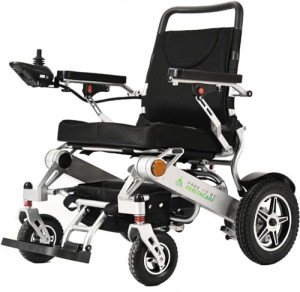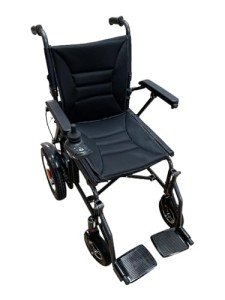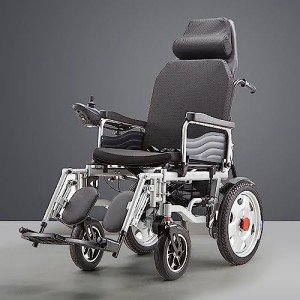In the realm of assistive technology, the development of lightweight folding electric wheelchairs with lithium batteries represents a significant leap forward in enhancing the quality of life for individuals with mobility challenges. These innovative devices combine the convenience of portability with the power and efficiency of modern battery technology, offering users unprecedented freedom and independence. This guide delves into the features, benefits, and practical considerations of these advanced mobility aids.
Introduction to Lightweight Folding Electric Wheelchairs
A lightweight folding electric wheelchair is designed to be compact, easy to transport, and highly maneuverable. These wheelchairs are typically constructed from lightweight materials such as aluminum or carbon fiber, making them significantly lighter than traditional models. The folding mechanism allows users to easily store and transport the wheelchair in a car trunk, on public transportation, or in a small living space. The integration of lithium batteries further enhances the wheelchair's performance, providing longer battery life and quicker charging times.
Key Features of Lightweight Folding Electric Wheelchairs
-
Lightweight Design
- Materials: Constructed from lightweight materials like aluminum or carbon fiber.
- Weight: Typically weighs between 30 to 50 pounds, making it easy to lift and move.
- Folding Mechanism: Quick and easy to fold, often with a one-step process.
-
Lithium Battery Technology
- Battery Type: High-capacity lithium-ion or lithium-polymer batteries.
- Battery Life: Can last up to 20 miles on a single charge, depending on the model.
- Charging Time: Fast charging capabilities, often fully charged within 4 to 6 hours.
-
Enhanced Mobility
- Speed: Can reach speeds of up to 5 to 8 miles per hour.
- Terrain: Designed to handle various terrains, including indoor and outdoor surfaces.
- Maneuverability: Small turning radius and agile design for easy navigation in tight spaces.
-
User-Friendly Controls
- Joystick Control: Intuitive and easy-to-use joystick for precise control.
- Speed Adjustment: Adjustable speed settings to accommodate different user preferences and environments.
- Safety Features: Anti-tip wheels, seat belts, and emergency stop buttons for added safety.
-
Comfort and Durability
- Seating: Comfortable and adjustable seating options, including cushioned seats and backrests.
- Durability: Built to last with robust construction and high-quality materials.
- Weather Resistance: Many models are designed to be weather-resistant, suitable for use in various climates.
Benefits of Lightweight Folding Electric Wheelchairs
-
Increased Independence
- Portability: Easy to transport and store, allowing users to travel more freely.
- Mobility: Enhanced ability to navigate different environments, including public spaces and natural terrains.
-
Improved Quality of Life
- Comfort: Enhanced seating and ergonomic design contribute to a more comfortable and enjoyable experience.
- Health: Reduced strain on the body, leading to better overall health and well-being.
-
Cost-Effective
- Maintenance: Lower maintenance costs compared to traditional electric wheelchairs.
- Longevity: Durable construction ensures a longer lifespan, providing better value for money.
-
Environmental Impact
- Energy Efficiency: Lithium batteries are more energy-efficient and have a longer lifespan than traditional batteries.
- Sustainability: Reduced environmental impact due to lower energy consumption and fewer battery replacements.
Practical Considerations
-
Choosing the Right Model
- User Needs: Consider the specific needs of the user, such as weight capacity, speed requirements, and terrain.
- Budget: Determine the budget and compare different models to find the best value for money.
- Brand Reputation: Research the reputation of the manufacturer and read reviews from other users.
-
Maintenance and Care
- Battery Care: Follow the manufacturer's guidelines for charging and maintaining the battery.
- Regular Check-ups: Schedule regular maintenance to ensure the wheelchair remains in optimal condition.
- Cleaning: Keep the wheelchair clean and dry to prevent damage and extend its lifespan.
-
Legal and Safety Regulations
- Local Laws: Familiarize yourself with local laws and regulations regarding the use of electric wheelchairs.
- Safety Standards: Ensure the wheelchair meets safety standards and certifications.
FAQs
Q: How long does a lithium battery last in a lightweight folding electric wheelchair?A: The battery life can vary depending on the model and usage, but most lightweight folding electric wheelchairs with lithium batteries can last up to 20 miles on a single charge.
Q: How long does it take to charge the battery?A: Most lithium batteries in these wheelchairs can be fully charged within 4 to 6 hours.
Q: Can these wheelchairs handle rough terrain?A: Yes, many lightweight folding electric wheelchairs are designed to handle various terrains, including indoor and outdoor surfaces. However, it's important to choose a model that is suitable for the specific terrains you will be using.
Q: Are these wheelchairs suitable for travel?A: Absolutely! The lightweight and folding design makes these wheelchairs easy to transport in a car trunk, on public transportation, or even as checked luggage on a plane.
Q: What is the weight capacity of these wheelchairs?A: The weight capacity can vary, but most lightweight folding electric wheelchairs can support users weighing up to 250 to 300 pounds. It's important to check the specific weight capacity of the model you are considering.
Lightweight folding electric wheelchairs with lithium batteries are a revolutionary advancement in mobility aids. They offer a perfect blend of portability, power, and comfort, making them an excellent choice for individuals with mobility challenges. By understanding the key features, benefits, and practical considerations, users can make informed decisions and enjoy the freedom and independence these advanced devices provide.






